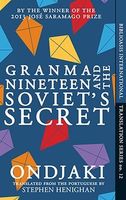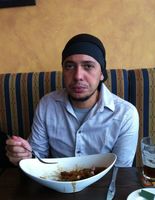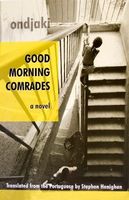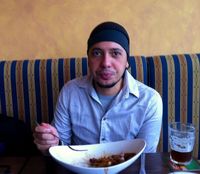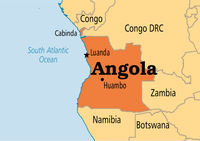Words & Curds: Ondjaki, Author of Granma Nineteen and the Soviet's Secret
By Evan Munday
It was Wednesday, April 30. Poutine time once again! I met with one of Angola's most acclaimed authors, Ondjaki, who has brand-new English translation, Granma Nineteen and the Soviet's Secret (translated by Stephen Henighan), published this spring by Biblioasis. Ondjaki was visiting Canada on a tour that involved Blue Metropolis, the Ottawa Writers Festival and the IFOA Weekly Series at Harbourfront Centre. We visited The Watermark Pub, on Queen's Quay, where we both ordered the Daily Poutine Special, which just happened to be peameal bacon. He was so close to finishing his, too. We talked about growing up in the '80s under Soviet influence, the importance of spaghetti westerns, beat cops (?), and suitcases full of potatoes.
About Granma Nineteen and the Soviet's Secret: (adapted from the Biblioasis site) By the beaches of Luanda, the Russians are building a grand mausoleum to honour the remains of the Comrade President. Granmas are whispering: houses, they say, will be dexploded, and everyone will have to leave. Can the children of Luanda steal the Russians' dynamite, decipher Comrade Gudafterov's letter, and save their homes? With the help of his friends Charlita and Pi (whom everyone calls 3.14), as well as assistance from Dr. Rafael KnockKnock, the Comrade Gas Jockey, the rather gruff and smelly Gudafterov, and Crazy Sea Foam's pet alligator, our young hero must decide exactly how much trouble he's willing to face to keep his Granma safe in Bishop's Beach.
EVAN: In Granma Nineteen and the Soviet's Secret, along with the previous book that was translated into English, Good Morning, Comrades, they're both set in Angola in the relatively recent past, and they both at it from the perspective of childhood. Both the narrators are fairly young. What made you decide to look at that period through a child's eyes, rather than, say, an adult's?
ONDJAKI: When I write about the '80s … and I think I chose the book, in a way, to continue the world …
EVAN: As a sort of companion piece?
ONDJAKI: Yes, with Good Morning, Comrades. And it's true. Because it's actually three books: it's Good Morning, Comrades, it's a short story book called Those of My Street, and this one, Granma Nineteen. These are the three about the '80s.
EVAN: A trilogy set in the '80s.
ONDJAKI: It's almost the same narrator. Almost. He is a boy, between ten and thirteen. For the first story – with Good Morning, Comrades – it was a coincidence. I found out it was good to have that voice. It's not the way that children see the world, it's the way I can use children's perspective to write as the narrator. I do have books with an adult narrator, but I can't write about the '80s otherwise. Even if it's a short story. If a newspaper asks me something about the '80s, I'll do these letters as if it was a boy writing. Using that boy's voice, I can work on things that are emotions but also political points of view that I'm interested in. Angola used to be a socialist country. And for us, that was not socialism. That was all we knew. That was normal. It's not like, 'How do you feel about that?' We didn't know! It was normal. And this idea that some things are complicated for adults but are quite normal for children is what interests me.
EVAN: In the book, the kids form a plan to dynamite this mausoleum before the construction of it displaces them from their home on Bishop's Beach. But throughout the book, the danger almost seems minimal. It's almost like a game to them. And the Soviet soldiers, who are, obviously, soldiers – they're carrying AK-47s. But the kids almost –
Your CanLit News
Subscribe to Open Book’s newsletter to get local book events, literary content, writing tips, and more in your inbox
ONDJAKI: And this is true. The neighbourhood existed. Still does.
EVAN: But the kids almost see [the Soviet soldiers] as comical. They make fun of their B.O.
ONDJAKI: (Laughs.) Yes.
EVAN: The tone of the book is more comic than anything else. What made you see it as a more comic story?
ONDJAKI: I didn't. It came out that way. It's the nature of the story, I guess. It's sort of a fantasy, and comic, in a way, because it's funny – the way they're playing with the image they have of the Soviets. When they're talking, one of the boys is making a false future perspective, but based on the past. Like, he's in the present, and he's telling to the others, 'Some day, we will remember this, this, this, and that.' Of course, that's my technique, not his, but what he's doing is he's saying to everyone else that when you're a kid, your street and, then, your neighbourhood, is the whole world. And they see the neighbourhood is threatened. His grandmother's house and the whole neighbourhood. So, it's the same as a country being invaded, you know? You have to decide! And they have this thing with war and soldiers. They have this friend –
EVAN: Andre, the Commando.
ONDJAKI: – yeah, the commando, Andre! And so they have these ideas … Plus, the cowboy movies they watch. Trinity. It's 'Trinity' in English, I guess. But the character was 'Trinita' in Portuguese. Can you imagine if you were a kid and you could use dynamite? I mean, in a way, they're playing. But on the other hand, they're defending the neighbourhood. They think it's a good idea. 'Oh, they're bringing dynamite to blow up our houses, why don't we blow up them first?' And that's it, as simple as that. I really would have liked for things to happen this way. But they didn't. They built the mausoleum. It's ready. They didn't blow up these houses. My grandmother's house is still there. And this is based on my grandmother's house … but they built this place somewhere else. So, I wish we had done that.
EVAN: It was kind of like wish fulfillment.
ONDJAKI: Yeah. Sometimes I write about the '80s with that perspective. I'm correcting some stuff. Using literature, of course. Not correcting the world. Because I can't. (Laughs.) It's another version of events. I believe and like this version more than the real one.
EVAN: You talked a bit about cowboy movies. Pop culture figures in a large way. The boys' scheme and plan comes largely from their knowledge of cowboy and Vietnam movies and they often compare life to some of the soap operas they watch. It's almost as if movies and TV are the way the kids learn about life outside the neighbourhood. If the neighbourhood is their whole world, these movies are like a window to another world. Is this sort of how you learned about things growing up, as well?
ONDJAKI: Yes, yes. I think TV was extremely important for us, especially the materials we were receiving through Brazillian soap operas. Some of the movies I remember. We had – one of the most important movies was, other than Trinity … with Bud Spencer and … what's his name? I'm seeing his face. You'd know him for sure … Terence Hill. Not sure if they're still alive. Bud Spencer is! [As of publication, they both are.] I've got an autograph from Bud Spencer. That was one of the most important things in my life.
EVAN: How old were you? Was this later?
ONDJAKI: Yeah. It was six years ago. But besides cowboys, spaghetti westerns, we used to have one of the first movies Jackie Chan did –
EVAN: (Notably excited.) Oh, are you talking about The Big Brawl? You mention that, too.
ONDJAKI: Yes. Was that translated into English?
EVAN: Yeah.
ONDJAKI: Oh! Okay. There were movies about crazy guys with the bicycles – BMX – and Godzilla or Soviet movies, as well. Or ninja movies. In a way – especially through the Brazilian soap operas – fiction was very important in our daily lives. Nothing was going on in Luanda in terms of fiction, other than our own fiction. The war was going on, but not in Luanda. We didn't have bombings or fighting or shootings in Luanda. We had the consequences of the war. Lack of electricity … it was 400 miles away. 1000 miles away. Angola is big. It's not as big as Canada, but it's big. So, we were living the fear and the rumours of the war – and this affects you, of course. You're always afraid of, 'Is this coming to town?'
EVAN: Yeah. How far away is that happening?
ONDJAKI: You listen the radio. Can you imagine something's happening in Vancouver, something's happening there or there. One or two bomb threatenings, but very rare stuff. But the main fear was that when anyone completed sixteen, you had to present yourself and do the tests [for military service]. Physical tests, you know. You'd get approved or not. You'd keep studying, but when you were eighteen, you would be called. And that was another thing: you had to study. Because as far as you were at school, you had more chances not to be called.
EVAN: So, if you were a good student –
ONDJAKI: Yeah, if you were eighteen and about to go to university, probably they would give you something – like a delaying thing. You'd present yourself when you were twenty-one or twenty-two. But you were afraid of that. You'd hear stories of people – during the night, raids would come and get you. When you were fourteen or fifteen. Just take you! Yes, cinema and soap operas – they were important for us. Especially the Brazilian ones. Some of those soap operas were sort of magic realism … soap operas with werewolves or magic … fantasy.
EVAN: And that informed your writing?
ONDJAKI: Yeah. When we were playing, we used to imitate them. We wanted to be Bud Spencer. Or Trinity.
EVAN: The narrator in the book is sometimes accused of remembering stuff as if he were an elder. Even though he's only twelve or thirteen. Is that the kind of kid you were? Did you see yourself as a writer, even at that age?
ONDJAKI: Yeah. At the same time, something I needed for that character, of course. But I had this very strong relationship within myself and my grandmother. Because this is my grandmother. She does indeed only have nine toes. She had a problem – not by then. It didn't happen during the '80s – [Poutines arrive.] Ooh-la-la.
EVAN: Thank you very much.
ONDJAKI: – It happens later in the '90s. But I put it in the '80s, because I wanted to put this Soviet, sort of, boyfriend of hers, and the Cuban doctor, who was a Cuban doctor who performed her surgery. Dr. KnockKnock. Rafael. Which is not his real name. And also, the scene where he invites her to dance before the surgery? That actually happened after the surgery.
EVAN: Oh.
ONDJAKI: He did the surgery, and then she woke up and was okay. And he said:
'You'll see, in a month, you're good.'
'Oh, don't say that, it's going to take a while.'
'No no no. In one month, just throw a party and invite me. I'll go there and dance with you.'
And we did so. She came home and after one month, we invited him and they danced. I thought it was beautiful. When I was writing this book, I sometimes saw it as a kind of movie. And I liked the idea, in the movie – because I can see it – being shot like that. In this hospital, not in very good condition, and suddenly, he puts a tango on and they dance, inside the hospital. So, yes, this boy and myself. He has a strong connection with all the elders. His grandmother, the other mother, Catarina, who you never know if she's there or not. This question came up in a Portuguese exam for I don't know which grade. I got several emails asking me, 'Please, tell us, was Grandma Catarina alive? Was she real?' And I'd say, 'I can't tell you that.' I don't know. We didn't know as kids. We didn't. Some people used to see her, some say she was already dead. You know, I don't know when she died. My grandmother doesn't know exactly when she died. And the kids kept talking to her, so you never know.
EVAN: She comes and goes.
ONDJAKI: Yeah. She hides herself if there's someone from outside the family. [Eats poutine.] Mmm. This is great.
EVAN: Is it?
ONDJAKI: It's tons of cholesterol and stuff, but, you know. That's life.
EVAN: Yeah. Especially with the reading tonight, you may not want to finish it. But feel free.
ONDJAKI: Okay. I'll try.
EVAN: Since you started talking about it already, you do seem like a very visual writer. The images that you come up with – some of them are so beautiful. And you've already answered some of those questions. Some of the images, like the slow dance in the military hospital, but also the children flying the kites in the wake of the explosion, or even – one of the greatest scenes, I thought – was Charlita's glasses and how she had to share them so everyone could watch the soap operas.
ONDJAKI: Charlita is a very powerful character. She keeps coming back. She's in the other book. There are two short stories totally dedicated to her. But this was a crazy family. There were five girls all with one pair of glasses. And the father was this strange guy. Always half-drunk. Always threatening to get his AK-47 in the bedroom. It was some sort of announcement all the time, whenever there was a problem, he would say to his wife, 'Isabelle, go upstairs and get the AK-47.'
EVAN: Like it was a script.
ONDJAKI: Yeah. I'm not doing it; you go there. And this is to warn people the AK-47 is coming. This is a real story. Once, he found out there was this priest in Bishop's Beach and I think he was a pedophile, you would say? We never knew if it was with boys or with girls, but something happened, and one day, Charlita's father, he knew about this. And one day, he was pissed off and went there. He wanted to kill the priest, and he asked Isabelle to get the AK-47. But he calmed down while she was doing it. She came with the AK-47, but she asked him not to use it. And he was very calm and he finally said, 'Okay. I'm just going to beat him. You can take the gun.' And he did so. And no one did anything, not even the bishops. Because they knew. People sometimes ask me, 'So, what is this story about the birds? Were the Soviets trafficking in strange birds?' No, I just made it up. It's beautiful, while the explosion goes on, and this crazy guy, Sea Foam, is running with the birds. I like that. And actually, Sea Foam actually existed. He was not totally crazy.
EVAN: And he doesn't seem so in the books. He was very … lucid at points.
ONDJAKI: He was just a little bit crazy, and he smoked a lot. Marijuana. But I didn't put that in the book. But what happened with Sea Foam? It's Fellini. This is the movie, Amarcord. There is this crazy guy, the guy who stays there in the tree. This is Fellini. I needed this crazy guy. There is a crazy guy in each village. In the cinema, in the books. That's him. It's nothing special.
EVAN: I guess some of these images actually happened and some came to you because they just were great images.
ONDJAKI: This book, in the earliest draft, 80 to 90 percent of the things were quite true. And based on my or other people's close memories.
EVAN: And have any of those people read the book?
ONDJAKI: Oh, yes. Charlita read the book. I think I stood, like, twenty-something years without seeing Charlita. And when the book was being presented – this one – I saw two girls come in very quietly … late. And I was looking at them and I said, 'Who are these girls?' They looked like someone.
EVAN: Was this at a book launch?
ONDJAKI: Yes. In Luanda. The first time I presented the book in Luanda. I think it was 2008. And then in the end, they're waiting there for me. She's tall, she has glasses … a weird look. She doesn't look at me. She's very shy. But the other girl says, 'You know who we are?' I said, 'No, but I kind of have an idea …' She says, 'I'm Audia and this is Charlita.' Audia, last time I saw her, she was four. Audia was the latest one … the youngest one. And Charlita is so shy. With another pair of glasses. First thing I say, I look at her and I say, 'Charlita, I'm so sorry.' And she says, 'About what?' And I say, 'About all the things I wrote.' That day, I felt like I shouldn't have used her name. She's really Charlita.
EVAN: You felt like you should have changed her name?
ONDJAKI: But she said, 'No, no. It's fine. It's all good. My father says he didn't have an AK-47 at home.' And I said I needed him to have that AK-47. That's how I remember it. I'm so sorry. I was very sorry about I don't know what.
EVAN: I haven't read the short stories, but I don't think you should be sorry. I loved Charlita. She's a great character.
ONDJAKI: No, everyone does! Yes, she's an amazing character because she has weird things. Not in this book so much, but that short story I'm talking about, it's exactly about the glasses. And it's weird. There's another short story – and it's true – where her father was able to get medical aid or medical assistance to go with her to Portugal to do a surgery. [Points to eyes.] Once they were there, he started drinking and he spent all the money … this is true … and everyone was waiting at Bishop's Beach for her to come.
EVAN: To see her without her glasses.
ONDJAKI: And she was exactly the same. The same dress, the same hair, the same glasses. Again, I don't know if that is how it happened, but this is how I wrote it and remember it. But she was okay with that. And she was very kind. 'No, no, it's all fine. All is good.'
EVAN: Names are really important in the book, and almost no one goes by their given name. There's Granma Nineteen because she had a toe amputated, there's 3.14 because his name is kind of like Pi. Sea Foam. Rafael KnockKnock. Gudafterov … they've all got nicknames.
ONDJAKI: This is Luanda. Everyone has a nickname. I didn't have any nickname. Which was weird, in a way, because everyone had one. Everyone. Sometimes it has nothing to do with you. You could be called 'John,' and your nickname will be 'Titi,' or 'Cuckoo,' or whatever. Not 'Big John' or anything like that, no. But this is something I do a lot in my books. There's another book, which is available in English. It's a very bad translation. It's not Stephen [Henighan, translator]. It's The Whistler. And the names mostly, it's by what they do. The Grave-Digger. The Whistler. They have no names. I think [Stephen] found very interesting expressions in English, because it's not exactly the same.
EVAN: There's a fair amount of the book that's about the comedy of language mix-ups. And given that people are speaking Portuguese and Spanish (or 'Cuban,' as they call it) and Russian … and all of them, when they're speaking in a different language are making different errors. What's your interest in language? Was it just growing up in an environment where many different languages are spoken?
ONDJAKI: It was very interesting, because we had so many – not the Soviets, we were not in touch with them. We kids didn't like them. But we had Cuban teachers at school, teaching almost everything but Portuguese … or English. They would teach math, chemistry, biology. And they couldn't speak Portuguese. So the first class, they would say, 'Okay, let's leave the last minutes of class to teach us Portuguese, and I can teach you some Spanish if you want.' After four months, we were speaking Cuban, as we called it. And they were not speaking Portuguese at all. It was very normal for us to mix with Spanish. Not like here – not like French and English! [Ondjaki maintains optimistic view of bilingualism in Ontario.] But we were okay with that. We totally understood them. Also, because of the soap operas. We knew the Brazilian accent. It was okay for us. We didn't imitate them, we didn't speak with a Brazilian accent. But we wouldn't find it strange if a Brazilian showed up in Luanda. We would think it was very, very nice to hear a Brazilian. A Brazilian would be interesting; a Portuguese from Portugal would be ridiculous.
EVAN: Really?
ONDJAKI: For us. Nothing to do with them. Or the colonial thing. The sound was, for us … it's very weird. Totally different. As far as South African accent from, like, English accent.
EVAN: And given that you have a knowledge of English – that you speak English very well – were you involved at all in the translation with Stephen?
ONDJAKI: Oh, yes. This time, especially. More than the first one.
EVAN: Was that kind of wordplay difficult?
ONDJAKI: No. I think he did a great job. It's not easy – I mean it's never easy to translate, but – those nuances. What he did is he had to create a language for the Soviets – in English! Because I did it in Portuguese. You have to feel that it's a Soviet trying to speak English. And the book is full of traps. Double-meanings. He was able to do it in English. I did read everything, and I had some things to say. He was very open, and we also had the collaboration of David Brookshaw, who, interestingly, is an English translator. He translates Mia Couto and other Angolan writers into British English. He had one or two things to say, but sometimes it wouldn't fit.
EVAN: Because of the dialect.
ONDJAKI: He would identify some problems, but then Stephen would say, okay, but we have to do it this way here [in Canada]. They did a very, very good job, I think. It's understandable what was going on in the original. You know, jokes and –
EVAN: I think jokes would be one of the hardest things to translate, but it reads as … you get it. You laugh at all the jokes.
ONDJAKI: It's good. I mean, English is one of the two languages that I can collaborate on … I just want to know and read my translations before they're published in English or Spanish. I can't do it in any other language. And even Italian, I can understand, but I don't know enough.
EVAN: It's funny that you say as a kid, you didn't interact with the Soviets, and you didn't like them, because in the book – not all of them – but at least Gudafterov and the gas jockey are kind of sympathetic characters. You see them as working for the military who are displacing people, but …
ONDJAKI: But you see, Gudafterov or Bilhardov – I don't think they like him, but it's okay. They hate the general, but they don't hate Bilhardov. He's just a weird guy. Because the soldiers didn't communicate with us. Bilhardov does, because he likes to go there and talk to grandmother. But otherwise, you don't see the soldiers, you don't know the soldiers. The general comes whenever there's a problem. He doesn't talk to us. Bilhardov talks a little bit, because he's interested. And this was the same with the Soviets. We found them very racist. They were obviously racist towards us. And, I mean, I'm not black, but the general population is, and you can't accept that. You can't find it normal if you're there. If you're racist, go someplace else. But you want to be there? You want to work? And that was the opposite of the Cubans. We had no problems with the Cubans. They were not racist at all. They were used to not having this and not having that. Luanda, by then, we didn't have so many things. Water, sometimes. It was normal for Cubans. But for the Soviets, not so normal. And they were 'friends.' They were not occupying. They were helping. So, yeah, we didn't like them.
EVAN: It's almost like with police … Gudafterov is almost like a … do you know what I mean when I say 'beat cop'?
ONDJAKI: No.
EVAN: They used to be much more common in North America, but not so much anymore. Where there would be police who would just sort of walk around a neighbourhood. And they would know everyone in the neighbourhood, right? The idea is that they would be your local cop, and just know everyone and be part of that neighbourhood. Whereas now, it's a lot more like cops are driving around in cars and just show up when someone needs to be arrested.
ONDJAKI: They're not there anymore.
EVAN: Yeah. It seems very much like the difference between the two [groups of Soviets]. Because they haven't interacted with that community except in negative ways.
ONDJAKI: If you think of the Soviets in this particular neighbourhood, you think of the mausoleum. You think, 'Oh, they run the show here.' We would see them in and out – also, Angolan workers. But it was a weird situation because the soldiers were there and armed. I know it was an important construction. The body of the president was there. So there were soldiers there. But they were rude. They were distant. Even with kids.
EVAN: One of my favourite bits – just because we're eating … how is it?
ONDJAKI: It's okay … no, it's good. I'm full, but it's good. You keep going.
EVAN: One of my favourite bits in the book is when the narrator is kind of ashamed because he's so happy to find that his grandma has to lose a toe, because he knows that there's going to be a big feast. He's ashamed because his grandma needs to lose a toe, but at the same time –
ONDJAKI: – there will be good food!
EVAN: Yeah. It's going to be great.
ONDJAKI: Well, it was not only in that neighbourhood. I never starved. We didn't have a variety of food all the time. But I was good, especially because my father, as a hobby – he was an engineer – but as a hobby, every Saturday, he would go out and fish. Fish by boat. But there was so much fish in the sea; he would bring tons of fish and distribute it among all the families. My sisters, for example, they don't like fish nowadays, because we ate fish from Monday to Friday. So they got this kind of soft trauma; they don't like fish anymore. But can you imagine? Fish is good, when you're growing up. Eating fish every day. It's healthy. It's good food.
EVAN: Fish is one of the better things you can eat.
ONDJAKI: You're not eating French fries and you're not eating whatever. [Subtle comment on the poutine.] You're eating grilled fish. This is great. But it was the same every day. Grilled fish. Fried fish. Fish stew. Fish this. Fish that. And the rice. There was rice. A party was interesting, but not that rare. Because once in a while, it's somebody's birthday. We didn't, for example, drink Coca-Cola or Fanta or Sprite every day, but in a party, there would be more. 'Oh, I might drink, like, three Coca-Colas today!' Sometimes you had to share one Coca-Cola for two or three. So, that day, you can drink your own Coca-Cola. Maybe two or three. This was a big thing! But we were not starving. There were people starving. I was not one of them. But the problem was the quantity or the variety. I did not starve at any moment. But I remember my auntie told me when she was coming from Portugal, I asked her to bring me potatoes. Everyone asked for chocolates or pens or pencils, and I said [whispers], 'Can you please bring potatoes?'
EVAN: Because you wanted to try them?
ONDJAKI: No, I was missing potatoes for a while. I didn't have potatoes for two or three months, and she said, 'I'm coming to Angola, what do you want?' And instead of saying chocolate, I said potatoes. She told me that story. I didn't remember. I was writing Good Morning, Comrades, and she said, 'Do you remember the potato story?' I said, 'Which story?' And this is a huge moment in the book. And I said, 'Is this true?' She said, 'You told me. Ask your mother.' And then my mother said, 'Don't you remember when she opened the suitcase and it was full of potatoes?'
EVAN: (Laughs.)
ONDJAKI: And she asked, 'Why did you bring potatoes?' And she said, 'Because your son asked me to!' I didn't remember. I must have been six or five. But this tells a lot. If you ask someone to bring you potatoes, it's because you want potatoes!
EVAN: One food that comes up pretty frequently in this book is green mangoes with salt.
ONDJAKI: Mmmmm.
EVAN: I don't know if you can describe it, but what does that taste like?
ONDJAKI: It's incredible! It's incredible-horrible. But when you're kids, because you can't do it, you do it. It's not good, you get diarrhea all the time. Green mango with salt – it's kids stuff. A green, green mango with salt, and we'd find that amazing.
EVAN: But your parents tried to prevent you from eating them?
ONDJAKI: No adults could see it. You've got to do it while hiding. And then, after doing it, I would go and tell my grandmother that they did it. Because I was the youngest one. And they would get beaten or grounded. And then they would say, 'We will never call you again.' Next time, I would promise, 'No, no. I won't tell.' All the time. I feel bad about that. One of the short stories is about that, in the other book. Exactly about that. Because there was this character, Magdalena – she is in this book, too, briefly – Magdalena was – she was not family, but she was treated as family. But she was the oldest one. We'd call her 'cousin.' If something goes wrong with the kids, and there is no adult present, she is responsible. That's how it is. She was, like, sixteen, and we were like, six, eight, twelve. So something happened: 'Oh, did you let them eat green mango with salt?' She would get beaten, all the time. Because of me. But I remember because I was there with them. And they didn't want to give me any more. And also, they were bullying me. And I was like, 'Just wait, just wait. As soon as my grandmother arrives.' I pointed: 'She did this. She went to pick up the salt. She had the mangoes. He brought the knife.'
EVAN: You were outlining all their crimes.
ONDJAKI: Mm-hm. Pointing people out. I was just terrible. But she got the worst of it.
EVAN: So, I guess you never want to be the oldest kid when something wrong is happening.
ONDJAKI: And nor the youngest. Because you suffer a lot from the older ones. But then somebody else comes along, and you're not the youngest anymore.
EVAN: It's like being the new kid at school.
ONDJAKI: Yeah. Other cousins came and it was okay.
EVAN: Is there anything close to this – close to poutine? In Luanda?
ONDJAKI: Mmmm. No, no. I mean, you have French fries in Angola all the time. But it's not typical. And not like that. We eat it with steak or whatever. Even with hamburger. But no. This is very good. There is some kind of sauce. There is also this sauce? What is this?
EVAN: Gravy and pieces of –
ONDJAKI: Is it ham?
EVAN: Well, it's bacon. It's bacon, but it's peameal bacon.
ONDJAKI: But it's not that strong … hard … red bacon. It's lighter.
EVAN: It's called peameal bacon. Some people call it Canadian bacon. There are big chunks of … it's looks more like ham.
ONDJAKI: Because usually bacon is …
EVAN: Thinner?
ONDJAKI: No, not thin. In Angola, you have that one … you cook scrambled eggs with it. But it's darker. It's harder, I guess.
Poutine Count:
Evan: 4
Authors: 0
The views expressed in the Writer-in-Residence blogs are those held by the authors and do not necessarily reflect the views of Open Book: Toronto.
The views expressed in the Writer-in-Residence blogs are those held by the authors and do not necessarily reflect the views of Open Book.
Evan Munday is the author and illustrator of the acclaimed book series for young readers, The Dead Kid Detective Agency. Both The Dead Kid Detective Agencyand its sequel, Dial M for Morna, were nominated for the Silver Birch Fiction Award.
Evan has worked in book marketing and publicity for ten years, eight of which were as publicist at Coach House Books, and he has since worked as a freelance illustrator and ebook designer.
Find out more about Evan on his website, idontlikemundays.com or follow him on Twitter at @idontlikemunday.
